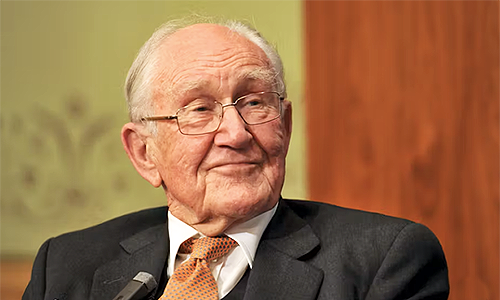
by JOHN MIKKELSEN – A FORMER Liberal Prime Minister Malcolm Fraser once said life wasn’t meant to be easy, but his plagiarised quote left out part of the original message.
Irish playwright George Bernard Shaw added the more optimistic: “but take courage, it can be delightful.”
- But thanks to the “delights” of modern life, a smart phone is now a necessity rather than a convenience.
- Even without the need to make calls, practically every major business now demands a digital code sent by SMS.
- And those codes are sent to my smartphone.
Unfortunately, those delights seem to be dwindling and, in the latest iteration of governments at Federal and State levels, it is getting less easy by the day on many levels.
Malcolm may have had a glimpse of the future.
RACIAL DIVISION
I put cost of living pressure and racial division, including anti-semitism, at the top of my list. But I’m not the only one who finds modern technology’s instant connectivity, AI, the push for digital IDs and ultimately a cashless society, of increasing concern.
For the past couple of weeks my mobile phone has been leading the charge for my tossing and turning at night. Why?
Blame Optus for its confusing messaging regarding the closure of its 3G network and the imminent switch to 4G.
Now, I’ll be the first to admit that my life does not revolve around my smart phone. I shake my head in wonder at the sight of girls and women – also boys and some men – who walk along our beautiful beach with their phone glued to their ear; or who cross busy roads while texting or scrolling on their devices.
With practically noiseless electric scooters and bikes now sharing our footpaths and streets, it’s an accident waiting to happen.
But thanks to the “delights” of modern life, a smart phone is now a necessity rather than a convenience.
Even without the need to make or receive calls, practically every major business and government department now demands a digital code sent by SMS to make contact or log in.
And those codes are sent to my smartphone.
But, I recently received a text from Optus which made me wonder if my phone really was smart.
“IMPORTANT NOTICE: Hi there, we’re reaching out to let you know that you’ll need to turn on ‘VoLTE’ calling on your device settings … so that you can make voice calls over our 4G network from October 28 2024. Otherwise you won’t be able to make voice calls from this date, as we’re switching off our 3G network, and your ability to call Triple Zero may be impacted…”
Well that caught me by surprise as I thought my Galaxy Android phone had access to 4G when I bought it a couple of years ago, but that message sounded definite.
So, I go to the site and the instructions appear fairly straightforward: “Once the latest software is installed, go into settings to request the 4G voice service and follow the prompts.
• Open Apps icon
• Locate Settings Icon
• Click Mobile Networks
• Select VoLTE to enable on the device.”
Yeah, right. I must be doing something wrong because I can’t find any mention of VoLTE anywhere on my mobile.
Seems I’m not alone, and it’s not just Optus, according to an ABC report:
“Queensland IT worker Serge didn’t think his 4G phone would be impacted by the gradual shutdown of Australia’s 3G networks – until one day when his device suddenly couldn’t make or receive calls.
“I was sort of in a bit of a panic,” he said. “I’m pulling my hair out. I’m connected to 4G. Everything seems to be working. Why can’t I make phone calls?”
WARNED
Serge said he was warned by his provider to upgrade his phone before telecommunications giant TPG (which now owns Vodafone) shut down its 3G network – but he ignored the warnings, believing his 4G device would not be affected.
More Australians like Serge are likely to be caught out by further 3G shutdowns this year, with millions of Telstra and Optus customers (as well as those using smaller providers on those two networks) to lose 3G coverage in the coming months.
The shutdowns are also causing concern for some people living and working in regional and rural areas.
VoLTE (short for voice over long-term evolution) is what most modern phones use to send voice calls over the same 4G and 5G channels that also carry other mobile data.
After doing some research, Serge said he discovered his Android phone did have VoLTE capability, but the toggle to enable it was in a hidden menu he could only access by putting a specific code into his phone’s dialler.
Crikey! If an IT worker couldn’t figure it out. What chance would a non-tech Boomer like me have?
But there’s more.
In evidence presented to a Senate inquiry in July, Australia’s second-largest mobile provider, Optus, said up to 150,000 could be left without access to critical functions like triple-zero calls, online banking and telehealth services after the shutdown in September.
Feeling more confused than ever, I phone a couple of my tech-savvy sons, one of whom suggests that maybe I don’t have to worry or I should have been receiving more warnings by text or whenever I made a phone call (which I don’t do often).
But with D-Day rapidly approaching, I finally decide to visit the local Optus office in a busy shopping centre.
PROBLEMS
Half a dozen staff are already occupied dealing with others who could be facing similar problems or trying to buy a new device, but eventually I am served by a pleasant young woman.
I hand over my phone and show her the text telling me I’m about to be cut off unless I download VoLTE. She only takes a couple of seconds before telling me, “No you don’t have to do anything, it’s all ok”.
“Well that text has caused me a lot of wasted time and bother.”
“Sorry about that, it’s just a universal message sent out by some little robot.”
I thank her, but think to myself “bloody AI again”.
Sure enough, next morning I receive a text from Optus confirming: “We’ve determined that this device will not be impacted when the Optus 3G network is switched off from October 28, 2024. You won’t need to do anything.”
Great. Fingers crossed that the little robot got it right this time! PC
– John Mikkelsen










